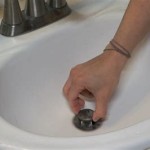Sink Drain Smells Like Mildew
A sink drain emitting a mildew odor is a common household problem. This unpleasant smell often indicates the presence of mold or mildew growth within the drain system. Understanding the causes, prevention, and remediation of this issue is crucial for maintaining a hygienic and pleasant-smelling home environment.
The primary cause of mildew odor in sink drains is the accumulation of organic matter. Food particles, soap residue, hair, and other debris can build up inside the drain pipes, creating a perfect breeding ground for mold and mildew. These organisms thrive in moist, dark environments, and the inside of a drain provides ideal conditions for their proliferation. As they grow, they release volatile organic compounds (VOCs), which contribute to the characteristic musty smell.
Stagnant water within the P-trap can also contribute to mildew growth. The P-trap is a U-shaped pipe designed to hold a small amount of water, creating a seal that prevents sewer gases from entering the home. However, if the sink is used infrequently, the water in the P-trap can evaporate, allowing sewer gases and odors to escape. Additionally, the stagnant water itself can become a breeding ground for mildew.
Biofilm formation further exacerbates the problem. Biofilm is a slimy layer composed of bacteria, fungi, and other microorganisms that adhere to surfaces within the drain. This biofilm traps organic matter and provides a protective environment for mildew growth, making it more difficult to eliminate the odor.
Several methods can effectively address mildew odor in sink drains. One common approach is to flush the drain with hot water. Boiling water can help to dislodge and flush away some of the organic matter and kill some of the mildew. However, this method may not be sufficient for heavily contaminated drains.
Baking soda and vinegar offer a natural cleaning solution. Pouring baking soda down the drain followed by vinegar creates a fizzing action that helps to break down organic matter and kill mildew. Allowing the mixture to sit for a period, typically 30 minutes, before flushing with hot water can enhance its effectiveness.
Commercial drain cleaners can be used for more stubborn clogs and mildew buildup. These cleaners typically contain chemicals that dissolve organic matter and kill microorganisms. It's important to follow the manufacturer's instructions carefully and to use appropriate safety precautions, such as wearing gloves and eye protection, when using these products.
Enzyme-based drain cleaners provide a more environmentally friendly option. These cleaners contain enzymes that break down organic matter without the use of harsh chemicals. While they may take longer to work than chemical cleaners, they are less likely to damage pipes and are safer for the environment.
Preventing mildew odor requires regular drain maintenance. Flushing the drain with hot water after each use can help to prevent the buildup of organic matter. Regularly cleaning the drain with baking soda and vinegar or an enzyme-based cleaner can also help to prevent mildew growth.
Proper ventilation in the bathroom or kitchen can also help to reduce moisture levels, which discourages mildew growth. Running the exhaust fan during and after showers or baths can help to remove excess moisture from the air.
Addressing plumbing issues promptly is crucial. Leaky pipes can contribute to excess moisture around the sink, creating a conducive environment for mildew growth. Repairing leaks promptly can help to prevent this problem.
In some cases, the mildew odor may be emanating from the garbage disposal. Food particles can get trapped in the disposal, leading to mildew growth. Regularly cleaning the garbage disposal with baking soda, vinegar, or ice cubes can help to eliminate odors and prevent mildew growth.
If the mildew odor persists despite these efforts, it may be necessary to contact a plumber. A plumber can inspect the drain system for underlying issues, such as clogs or leaks, and provide professional cleaning or repairs as needed.
Maintaining a clean and odor-free sink drain is essential for a healthy home environment. By understanding the causes of mildew odor and implementing preventative measures and appropriate cleaning methods, homeowners can effectively address this common problem and maintain a pleasant-smelling kitchen or bathroom.

How To Remove Musty Odors From Kitchen Sink Water Damage

How To Clean A Stinky Sink Drain

What Causes Black Mold In Sink Drains How To Get Rid Of It

Deodorize A Kitchen Sink That Smells 5 Ways Youtube

How To Effectively Remove Black Mold In Sink Drains Damage Control

What Causes Black Mold In Sink Drains How To Remove It

Kitchen Plumbing How To Remove Mildew Smell From A

Why Is There A Smell Under My Sink

Bathroom Sink Drain Smells Bad Get Rid Of Odor

What To Do When The Bathroom Sink Smells Like Mildew







